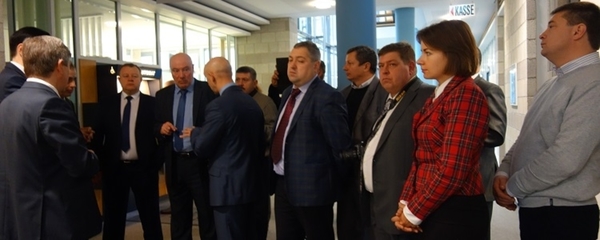Decentralisation in practice: representatives of Ukrainian hromadas visited Germany
Heads of several Ukrainian amalgamated hromadas visited the German Land of Baden-Württemberg to learn more about decentralisation and local self-government in Germany. The two 5-day-long study tours, organised by the U-LEAD programme in late November – early December, brought 20 Ukrainian participants from the Poltava and Chernivtsi oblasts to see the self-government in action with their own eyes.
"After this very well prepared trip, I have been once again persuaded that the hromada is not about budget, taxes, territory and structures – it is primarily a conscious association of people united for their development,” said Hryhoriy Vanzuriak, head of the Hlyboka amalgamated hromada (Chernivtsi oblast). “So, if today someone with a pencil and a map creates plans and thinks that budget figures are the only thing that count, it’s quite wrong. The core is people who need to create conditions for their development, and the German example once again proves this truth."
The intensive series of meetings started in the town of Eigeltingen. Its mayor told the guests how six local villages merged into one new community and set up an autonomous heating system. Later the Ukrainians visited the сounty office (Landratsamt) of Tuttlingen where they learned about the tasks and state of finance of German communities at the example of Tuttlingen. Then the guests had a meeting with the head of the local district hospital, who told them about financing and health issues in Germany. The Ukrainian delegation also visited the modern storage of waste and learned about waste management. Later, in Mühlheim an der Donau, the study tour participants discussed the opportunities for cooperation between several communities in sewage treatment.
The delegation had a chance to see Vorderen Schloss, a renovated castle, where the issues of obtaining construction funds for a successful urban rehabilitation of the upper city of Mülheim were discussed. The visitors also travelled through the valley of the Danube to view several places, including a recreation facility and a brewery, and discuss the development of tourism in rural communities in association with regional and interregional partners. They visited a new fire station and learned about financing of road construction in Baden-Württemberg from Oliver Ehret, the former mayor.
 The Ukrainian participants were interested in sustainable management approach at all levels of government and in all areas of life. The approach to wastewater treatment and water supply, especially in small communities, is very important issue for them, as these requirements are generally accepted European standards to be implemented in Ukraine.
The Ukrainian participants were interested in sustainable management approach at all levels of government and in all areas of life. The approach to wastewater treatment and water supply, especially in small communities, is very important issue for them, as these requirements are generally accepted European standards to be implemented in Ukraine.
Dual education and creation of new jobs, support for entrepreneurs and prevention of brain-drain from villages are crucial points of reforms in Ukraine. The German experience of tackling similar issues may set an encouraging example of sustainable development.
U-LEAD with Europe (Ukraine – Local Empowerment, Accountability and Development Programme) is a multi-donor action of the European Union and its Member States Denmark, Germany, Poland and Sweden.
U-LEAD contributes to the establishment of multilevel governance which is transparent, accountable and responsive to the needs of the population. This includes enhancing the capacity of key actors at central, regional and local levels to implement the regional policy and decentralisation reform, as well as improving the delivery of local administrative services for the benefit of the citizens of Ukraine.

Source:
U-LEAD

27 November 2024
Послуга «Патронат над дитиною»: як залишити дитину в сімейному середовищі
Послуга «Патронат над дитиною»: як залишити...
Патронат над дитиною — це послуга в громадах, завдяки якій діти залишаються в сімейному середовищі навіть тоді, коли...
27 November 2024
Парламентський комітет напрацював рекомендації...
25–26 листопада 2024 року у Вінниці відбувся круглий стіл на тему: «Практика діяльності центрів надання...
27 November 2024
Робоча група з розробки комплексного плану просторового розвитку: що та як робити?
Робоча група з розробки комплексного плану...
Комплексні плани просторового розвитку стають обов’язковими для всіх територіальних громад з 1 січня 2025 року. Проте...
27 November 2024
Де знайти «зайвий» мільйон євро? Інтерв’ю голови громади
Де знайти «зайвий» мільйон євро? Інтерв’ю...
Голова Великоберезнянської громади Закарпатської області Богдан Кирлик про те, як подвоїти бюджет громади й будувати...